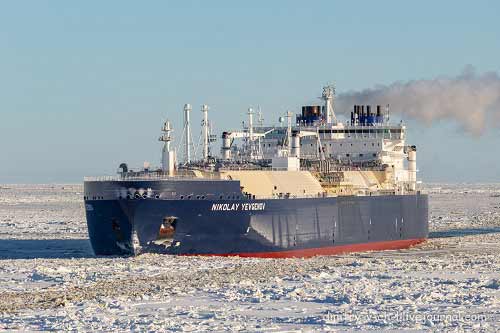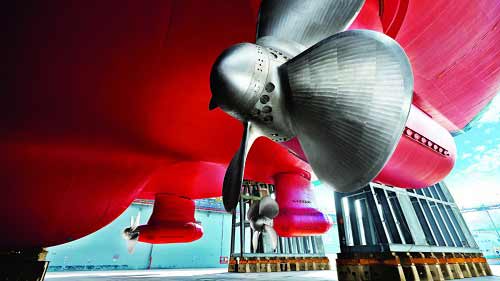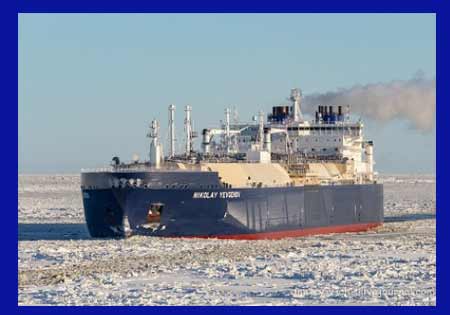- by Anatoliy Matronyuk, Master Mariner, Chief Officer at Teekay LNG

Guest contributor: Anatoliy Matronyuk
Leadership
How often do we see this word?.. Magazines, newspapers, social networks, video hosting services – all have lots of information about it. The bookstores sell dozens of various authors and their writings about the subject. But here we are still talking about the perpetual lack of it or, in the best-case; misinterpretation.
It has been about a century since the concept of leadership was formulated and analyzed. And within that period, the researchers have identified at least thirteen models. Earlier theories were stating that the leaders had been born and not made, which today sounds nonsense. The evolution of leadership was happening together with the development of a business management approach. The modern way focuses not on the leader but on the context he or she leads with particular attention towards relationships. Exploitative and authoritative leadership has changed to what nowadays is called an implicit, or in other words, an inspirational leadership theory. It defines leadership as the art of getting people to want to do what must be done. True leadership only exists if people follow when they otherwise have the freedom to not follow. And I believe this model perfectly suits the way we interact and collaborate at sea.
Shipping is a wonderful place to study leadership
There are teams within teams that are identical. Vessel A and vessel B can be in the same fleet. They have exactly the same structure and equipment. The only difference between them is the personnel forming their crews and how they are led. You can look at vessel A, and her performance will be outstanding. Then you look at vessel B, and she is at the bottom of the table. What is the difference, you ask? The answer: the leader. Albeit we have an organized structure and tons of rules and regulations specifying every step, we still very much depend on the availability of a good leader without whom the structure tends to fall apart. Strong leadership is paramount in maintaining progress and effective operation. But what does it mean to be a successful leader, and what traits he or she must possess? To answer this question, let's take a look at the Yamal LNG fleet, where I have a pleasure to work and the features that make these ships so unique.
Imagine if the Arc7 Yamal ship was your leadership style and her voyage through the hostile arctic waters your career path

Photo courtesy: Capt. Dmitry Lobusov
At least eight months a year, the Arctic waters are covered with ice, as we all know. It can be new and easy, or it can be old and difficult. But it always requires great attention to sail through. So, the ice is the environment where you exist. It holds all that things like knowledge gaps, mistakes or unforeseen challenges that permanently slow you down and work against the pace of your progress. If their combined efforts are too overwhelming, then you will stop moving. Getting beset in ice means that you rely on ambient conditions like winds and currents. Not the best feeling… No one knows where they will end up! Your task is to use all your wisdom and intelligence to avoid those traps carefully placed on the route. As well as be strong enough to withstand the force of ice.
The design of the hull is there to help you. Its shape is your integrity
There will always be something to test the strength of your integrity or the strength of your moral principles. How correct your principles greatly affect how far you will succeed on the voyage of your career. Will you be honest? Will you be able to admit mistakes? Often ice navigation requires reversing the propulsion and moving backwards to carve a new path. Each time you do that, you admit that the way you initially chose was the wrong one. Are you afraid to do that in real life? Of course not! Mistakes will be made in our careers because we are imperfect people.
Consider a mistake not as a failure but as a possibility to learn and improve as it could be a powerful lesson. The rule of an acceptable mistake is that it should not make your company suffer a financial loss, damage to reputation, or hurt anyone’s life or career. The majority of mistakes can be rectified without consequences. Your integrity leaves a wake behind that affects the trajectories of the others. Often during ice navigation, mariners prefer to use the ice channel made by another strong ship even if they initially had no such intention. As a leader, you need to realize that it is not just you who may deal with the outcome of your actions and decisions. They will impact others too. Leaders with a growth mindset understand that nobody comes to make mistakes on purpose. You do not have to be perfect in everything you do. And you should not feel like you cannot make mistakes. You will make mistakes. What is important is the way you treat them. You do not inspire others by being perfect. You inspire others by how you deal with your imperfections.
Scratches and indents on the hull form your ego
You may have a perfectly designed hull, but If you have a giant ego, it will work together with the ice to brake your acceleration. Despite the ego alone won’t completely stop you from moving forward, it can adversely affect the average speed of your voyage and will definitely require additional power. Most obstacles that limit people’s potential are set in motion by the leader and eroded by his own fears, ego needs and unproductive habits. To build a strong team, you must see someone else’s strength to complement your weakness and not a threat to your position and authority. Leaders are willing to put a ship’s performance ahead of their egos and lead by inspiration rather than brute force. Which for some people is harder than for others. True leaders never place themselves ahead of others and prefer to build themselves up by strengthening others and helping them to feel good about their jobs. Leadership begins from looking into a mirror. If the leader can drop his kinglike attitude and learn to respect his sailor’s natural talents and unique qualities, they will come to trust him and work a lot harder than they ever will for a self-important individual.
The fuel that you have onboard is your knowledge
You never start the voyage without having enough fuel. It ensures your move forward, to go from one point to another. From time to time, you will need to take on a new fuel or gain new knowledge. The quality of this knowledge defines how far you will go on your journey. As a leader, you have to know what knowledge is required to achieve the new targets. There is absolutely no excuse for not knowing everything needed to perform in your current position successfully. Learn the importance of getting new knowledge continuously. You cannot sit still. You have to get better. In five years, if you are not learning, you can be irrelevant. In other words, when you stop growing, you start dying. I deeply believe in the value of learning. And it is most effective as a part of a continuous process. The intellectual thirst for knowledge is an essential trait of every great leader. Being motivated to learn is fun, engaging, exciting and enjoyable.
The propulsion system forms the three core drivers of leadership. Your port azipod is influence. Your starboard azipod is developing others. And your middle one is communication.

Azipods on the ice-class tanker. Photo courtesy: Riviera Maritime Media
Influence in leadership means the ability to have an effect on other people and their actions. Many people make the mistake of thinking that leadership is all about having authority over people, and they believe that their title gives them the power to force certain behaviours from people. Oh no, this is not leadership; this is a dictatorship. Influence is not “just do it because I’m the boss” or “because that’s what I said”. The perception that leadership is about leading by force is dead. Never confuse your rank with your leadership. People do not follow a person. They follow or would like to work with those who can bring benefits into their life. Today’s leaders become great not because of their power but because of their ability to empower others. Leadership has nothing to do with having authority over someone. When you understand that it's all about people and using your influence to inspire, empower, and motivate your team to become the very best, your company will become one of the best in the world. The most effective leaders work hard at showing people how to find their own solutions and then proceed in their own ways. The art of leadership lies in simple things. Common sense actions that ensure high morale and increase the odds of winning. Being a leader does not require a title. More so, the title does not necessarily make you one. Real leadership is not about authority or power. It is a choice, not a position. In order to lead, you need to care, think mindfully and, for your sake, do the right things, not the easy things.
An essential and often neglected part of leadership is something that not many individual contributors are known for – you develop others

Good leaders are known for making time to develop others. Photo courtesy: Capt. Bilju Alocious, seen here with a St.Lawrence River Pilot
Good leaders are known for making time to develop others. If your crew is lucky enough to receive a development infusion, they will probably experience positive outcomes like higher salaries, compensations, promotions and recognition. And who knows which way, when and where the payoff will catch you up. I see now a lot of indignation that the vessel is not a school or kindergarten, and anybody signing on must have complete knowledge needed to be operational. You may say that developing others takes so much time out of your day that it will be almost impossible to do your own work. But developing others is part of your work. Developing others helps you in your own career, and there are several theoretical reasons why. It includes learning more information to make you effective in your job and growing your reputation. You will tend to have higher job satisfaction and organizational commitment. And you will view your own career as successful. Leaders who develop others are better performers in their jobs.
On achieving certain skills, many senior officers begin to experience difficulty in finding the motivation to work and continue self-development. As a result, they become concentrated on irrelevant things, lose attention to technological and regulatory progress and thus a qualification. Developing others is a trick to overcome such stagnation and inexhaustible motivation to continue work. You have already achieved a great level of professional excellence, so share it with others. Many younger people do not even know what excellence is. It is not that they are bad people; just that they have never had a role model to inspire them. Or maybe their friends always sneered at high achievers, so they have settled to doing nothing but the minimum. The challenge is to show these people excellence in action and inspire them to run it in their own lives. We continue to invest in the latest technologies and systems, but we all know technology is nothing but a facilitator. The people operating the equipment are those who give us a cutting edge. And we should not lose our way to come in helping them grow.
Communication is the ability to convey and spread your message to the world
However, apart from that, it is also the ability to listen and digest the information provided. We often think that listening is a passive thing, but listening is the most active thing. The way you respond to a provided information keeps its provider motivated to continue. The key to successful communication is to treat the subordinates reporting to you with the same dignity and respect as you treat the superiors whom you report. Creating a climate of trust starts with the leader. He must endeavour to bring about the idea that collaboration is a top priority. The team culture must be sustainable and enjoyable, and the team members must feel that they are actually on a team instead of just a group of individuals trying to beat each other. History records countless incidents in which the leaders permitted a climate of intimidation to prevail in the workplace. Silencing subordinates whose warnings could have prevented a disaster. Listen not with an intention to reply but with an intention to understand. And never shred a provider of unpleasant information because the leader who doesn’t listen will obviously have the crew who has nothing to say. All leaders are great communicators. They know how to listen and what to say. Communication is a natural product of deep learning. You have to learn how to write in an intelligent way and speak correctly if you want to avoid a quick derailment of your career.
Let us now invite onboard a potential customer who is looking to employ the Yamal ship
Put yourself in his shoes and ask what does he want from your vessel? Without a doubt, he wants to see the unit that meets all operational commitments. If you have a great hull but lots of scratches on it, then you’ll probably not be the best choice. If your fuel is below spec, you will not get hired. If your azipods are not well maintained, it will be difficult for you to move through challenging ambient conditions. Your ultimate target is to make sure that your ship is delivering better results than the other ships around in order to be employed for higher money. Excellent leaders get results, as simple as that. That is not easy but can be done. Keep your hull as shipshape as possible. Always look for a new and better fuel. Spend the time to learn about ice. And make sure that all your three pods are able to deliver full thrust. Find your own way to leadership as there is no simple answer on what leadership is and what it means to be a leader.

Leadership cannot be described by a simple definition as much depends on the environment of where the leadership toolkit is to be applied
Perhaps, for a junior level, leadership could be most suitably defined as the art of doing simple things very well and helping others achieve that. Yet, at a senior level, leading is about providing purpose, direction, motivation, and giving support to the crew. Presenting a vision, seeing the bigger picture, advising the strategy and taking the responsibility to accomplish the mission at hand. The effect of leading is inspiration and empowerment. It is rising by lifting others. It comes via hard work, which often extends beyond the adopted standards and will not be reached without proper knowledge and goodwill.
When you raise your hand and step into the role of the leader, you are making a choice, whether you are conscious of it or not, to be responsible for the results of your team, whatever that result is. Being accountable for the result may sound like a cliche. But just because something is a cliche does not mean it ceases to be true. Success is no longer defined by all the things “I” can do. Success as a leader is defined by all the things your direct reports and team can accomplish. Being accountable for your team’s performance is a part of leadership. You will have to do things that affect the lives of others in your organization. Does it mean that anybody on a ship and not only the top seniors can be the leader? Yes, it does. If you perform your duties safely, diligently and demand the same from the others, then you are the leader. If you care about your own and others’ achievements, the success of your ship and your company, then you are the leader. You need to love what you are doing beyond the reasons of accolade and have no desire to play the game of being better than anyone. Try to be better than the person you were yesterday. That is what makes the difference between an outstanding and ordinary ship.
A great ship cannot be borne by the efforts of a single person. A great ship is a combined job and the responsibility of the whole crew. No one can use a bad performance of his superior as an excuse for their own underperformance. Shipmates do not stay in bubbles, and each rank on the vessel is there for a reason. The exchange of values should be mutual. It is not a success when one person is always giving, and others are always taking. Everyone has something to offer. And the task of each leader is to take that offer and implement it in favour of all. Great shipping leaders always produce future leaders the same natural way as the words the leader and the ship form the word leadership. The ship, where everyone is a leader is not a dream, but an achievable target.


